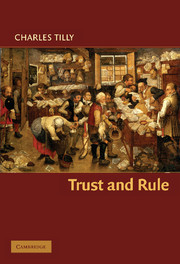4 - TRUST NETWORKS VERSUS PREDATORS
Published online by Cambridge University Press: 07 December 2009
Summary
Born in Haverford West, Wales, on the Irish Sea, around 1682, John Roberts went to sea on merchant vessels. By 1719, he was the thirty-seven-year-old mate of a slave ship operating across the Atlantic. In June of that year, fellow Welshman and former slave ship officer Howell Davis, who had turned pirate in 1718, captured Roberts' vessel and enlisted Roberts in his crew. Davis' men, including Roberts, alternated among piracy (that is, seizure of commercial vessels, their goods, and sometimes their crews for private profit), privateering (that is, government-licensed piracy), and regular commerce for the next year. Then Davis' duplicity overreached itself. In the Portuguese slaving colony of Principé, the Portuguese militia received a credible report that Davis was planning to kidnap the governor. Prudently, they ambushed and killed Davis.
The marauders could not continue without a captain. The crew therefore gathered to drink, smoke, and deliberate about the succession. In his colorful General History of the Pyrates, first published in 1724, Daniel Defoe put this speech in the mouth of a pirate officer, Lord Dennis:
We are the Original of this claim (says he) and should a Captain be so sawcy as to exceed Prescription at any time, why down with him! it will be a Caution after he is dead to his Successors, of what fatal Consequence any sort of assuming may be. However, it is my Advice, that, while we are sober, we pitch upon a Man of Courage, and skill'd in Navigation, one, who by his Counsel and Bravery seems best able to defend this Commonwealth, and ward us from the Dangers and Tempests of an instable Element, and the fatal Consequences of Anarchy; and such a one I take Roberts to be.[…]
- Type
- Chapter
- Information
- Trust and Rule , pp. 79 - 99Publisher: Cambridge University PressPrint publication year: 2005



